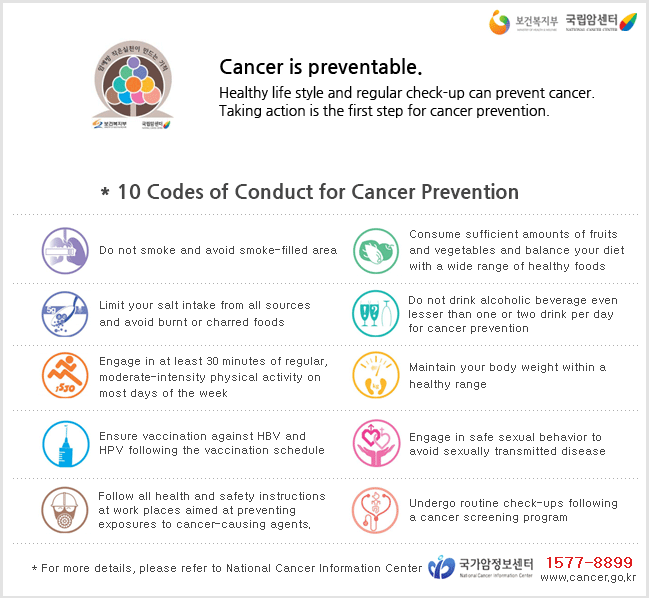Support for the National Cancer Control Programs
NCC serves as a cancer control policy think-tank. The NCC currently supports a wide range of cancer control activitiesin close cooperation with the Ministry of Health & Welfare, thereby contributing towards reducing the national cancer burden. The planning, management and evaluation of the cancer control programs are being conducted by the NCC primarily through the National Cancer Control Research Institute (NCCRI), one of the NCC's three divisions.
Following are some of the major cancer control programs currently underway in Korea:
National R&D Program for Cancer Control
This cancer-oriented R&D program was initiated in 1996 when the Ministry of Health & Welfare formulated its
comprehensive 10-year plan for cancer control. The projects it has supported are very wide in terms of subject,
ranging from epidemiological approaches to the development of state-of-the-art therapeutic technologies. NCC
plans, manages and evaluates the initiatives by funding them.
National Cancer Registration Program
The Korea Central Cancer Registry (KCCR), a hospital-based national cancer registry, was set up in 1980 and has
been registering cancer occurences since then. The KCCR first started collecting comprehensive cancer-related
information for the whole population of Korea in 1995 when population-based regional cancer registries were
introduced under the aegis of the KCCR. The information collected through this program is used in the planning
of national cancer strategies as well as research. The NCC currently functions as the Headquarters for the National
Cancer Registry.
National Cancer Screening Program
Initiated in 1999 by the government, the National Cancer Screening Program (NCSP) provides targeted population
with free screening services for five common cancers - stomach, liver, colorectum, breast, and uterine cervix.
The NCC provides the government with policy alternatives and recommendations to improve the program in terms
of both quantity and quality.
Cancer Patients Management Program
The home-based cancer patient management program was designed in 2001 to provide low-income cancer patients at home or in nursing homes with a variety of medical care services, including consultations, pain control, nursing care and medication, free of charge. Health care providers in public health centers such as nurses, physicians, and other health professionals take part in this program. Also, the government launched the terminal cancer patient care initiative in 2005 to help palliative care units in local areas. It will improve the quality of palliative care for terminal cancer patients through education and other kinds of support.
Regional Cancer Center Support Program
The government has strived to reduce regional disparity in cancer care services by building up the cancer care infrastructure and enhancing accessibility to cancer care services. Currently, a total of nine university hospitals in nine provinces are designated as regional cancer centers (RRCs). A hospital, once designated as RRC, is provided with financial support to build up its cancer care facilities and conduct cancer control activities at the regional level.
Financial Aid Program for Cancer Patients
The financial aid program for cancer patients was introduced to relieve the financial burden of low-income patients. The program first helped leukemia patients under 18 in 2002. Since then, it has expanded its coverage to include medical aid beneficiaries and low-income National Health Insurance beneficiaries.
Operation of National Cancer Information Center & Tobacco Quitline Program
NCC started to provide a comprehensive cancer information service by opening the National Cancer Information
Center (NCIC) in April 2005. The center was designed to give cancer patients and their family members the most
up-to-date, evidence-based information on all types of cancer through a call center service at 82-1577-8899,
web site (http://www.cancer.go.kr), and publications.
NCC also runs a call center that offers evidence-based information about the relationship between smoking and
cancer and helps smokers quit. Well-trained counselors are available to answer smoking-related questions at
82-1544-9030








